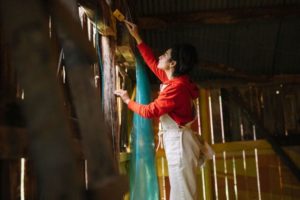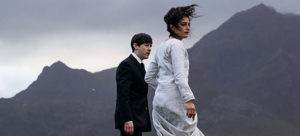Click here for the flashback interview with Jenny Slate for OBVIOUS CHILD.
We begin THE SUNLIT NIGHT, based on the novel by Rebecca Dinerstein (who also wrote the screenplay) with aspiring artist Frances (Jenny Slate) undergoing a critique of her latest canvas. It is not going well. One of the trio of critics avers that the painting makes him angry. Thus begins her journey, artistic and literal, in this understated yet study of art and life that is sharp, uncompromising, and suffused with mordant humor amid the tragedies and quirks of la vie quotidienne.

Jenny Slate
That critique is only the first of a series of cascading disasters crashing in on Frances as, in quick succession, she breaks up with her boyfriend, deals with her sister getting engaged, is passed over for an artist’s residency in Tokyo, and learns that her parents are splitting up. That last will leave her with no place to live in New York, where even the cramped quarters of a one-bedroom split between four people is a dream come true. Untethered on many levels, she is offered a residency in the far north of Norway where she will be painting a barn using only shades of yellow. It’s the brainchild of taciturn artist, Nils (Fridjov Sáheim), who would rather be left completely alone. Hence her banishment to a tiny trailer next to Nils’ spacious house, where she copes with thin curtains in a place where the sun never sets, goats that make themselves at home on her bed, and the discovery that what’s she’s signed up for is not so much a residency as an apprenticeship where she will be essentially painting by numbers everyday from 7am to 7pm. But Frances has pluck, and a place to live, and so she plunges in, finding the unexpectedly lyric in the banal, and an artistic voice to call her own.

Zach Galifianakis
Slate brings the perfect blend of strength and vulnerability to a character who is driven, but who has not given any real thought to a destination. Her sense of irony is sublime, and it carries this finely observed character study through the oddball inhabitants of the story. From the Cleveland transplant (Zach Galifianakis) who takes his job as a history re-enactor at the local Viking museum, to the hollow-eyed tourist (Alex Sharp) making a sacred pilgrimage after losing what mattered most to him and gaining what he least wants, to the Frances’ father (David Paymer) who makes his living as a medical illustrator but longs to draw with the intensity of Dürer, each evokes in their lives the tension between the reality of art and the illusion of reality in which Frances lives. For her, real life is merely the touchstone for great works: the enigmatic face behind the refrigerated dairy products in the local market is a Botticelli angel. Another stranger at the side of the road a boy painted by Caravaggio.
The claustrophobia of New York gives way to the expanses of rural Norway, creating of metaphor of expanded awareness from the majestic, slightly foreboding, mountains and endless open sea. As Nils eventually gets used to Frances, it’s never quite a warming up from this perfect example of a curmudgeon, Frances begins to see the subtlety of the structures behind the yellow shapes on the barn. By extension, she also begins to see the workings beneath the faces she sees.

Alex Cross, Slate
Rich in gorgeous cinematography that makes a grey landscape as dazzling as primary colors, and with quietly complex performances that reveal unspoken volumes, THE SUNLIT NIGHT defies convention as surely as good art should, while also finding something universally resonant.
Really enjoyed it. Really beautiful cinematography.